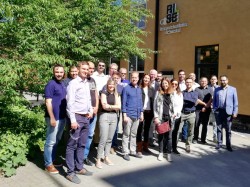How to increase the component density on the printed circuit board (PCB)?
Solder paste is one of the most critical ingredients in the manufacturing of PCBs nowadays. The ability to produce a solder paste with a smaller particle size allows the fabrication of smaller PCBs. Thus, every component that relies on this type of electrical circuit board (every electronic device) can see its size decreased. On May 30th and 31st the 30M FineSol consortium meeting took place in Sweden. RISE organised this meeting, and during the meeting the project partners discussed the progress made in each work package and the overall advancement of the project. Essential discussions took place during the meeting with focus on the technical improvements of the project. Moreover, critical issues were discussed among the partners and the work plan for the next six months of the project was set. TEST RESULTS OF FineSol SOLDER PASTE WERE PRESENTED DURING THE PROJECT PARTNERS' MEETING The objective of the meeting was also to present the latest technical developments in the project, including regarding the tests with the produced FineSol solder paste. Producing solder pastes with a maximum particle size smaller than 15 µm is not economically/technically feasible. The meeting allowed the partners responsible for the development of such a solder paste to show the results obtained until the present date. Proof of feasibility is required for such technology since this type of solder paste is only being produced for research applications. The meeting also included an industry visit to the premises of the host of the 30M FineSol Meeting (RISE), where the technical operations and the R&D labs of the company were demonstrated to the FineSol partners by its technical and R&D directors. ABOUT the FineSol PROJECT The EU electronic industry faces some challenges with the enormous quantity of raw materials that it needs for sustainability, the massive amount of Waste Electrical, Electronics Equipment (WEEE) generated and the threat of competition from Asia. To manage its growth and the impact of WEEE and to face the Asian competition, the EU electronic industry needs to innovate in key areas, such as the drive for equipment ultra-miniaturisation/ultra-functionality. The key limitation to achieving this is how to increase the component density on the printed circuit board (PCB), which is also limited by the availability of hyperfine pitch solder powder pastes. By delivering an integrated production line for solder particles with size 1-10 µm and by formulating solder pastes containing these particles, the FineSol project aims to reduce the ultra-miniaturisation/functionality limitation, to reduce the quantity of raw material usage, to reduce WEEE, pollution and associated health costs.
Keywords
Countries
Belgium, Cyprus, Denmark, Greece, Italy, Netherlands, Poland, Portugal, Sweden, United Kingdom



